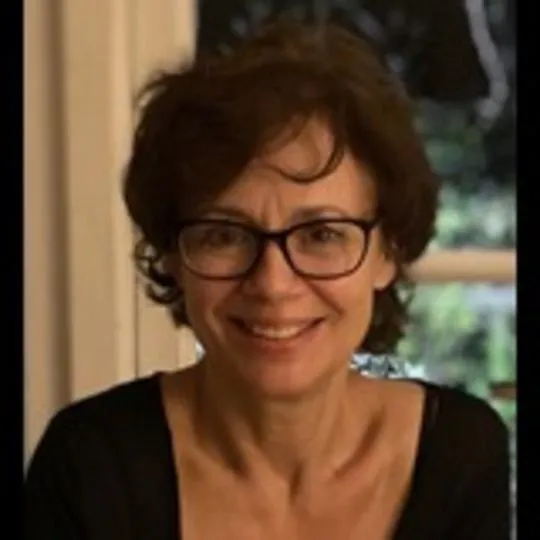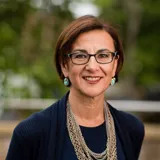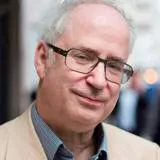King’s have been our friends and allies since the beginning of the APPG on Arts, Health and Wellbeing’s Inquiry in 2015-17. That inquiry and the Creative Health report published in 2017 laid the foundations for the Creative Health Review which we launched in October 2022. The purpose of the Creative Health Review is to make recommendations to Government and to Metro Mayors for a cross-governmental strategy to enable the full potential of Creative Health to help meet the myriad challenges facing our communities. These challenges demand a new approach. One that is forward-thinking, preventative, and person-centred.
Lord Howarth of Newport, Chair of the Commission
07 December 2023
Arts must form an integral part of modern health and social care, report shows
The landmark Creative Health Review report was launched at Science Gallery London at King’s
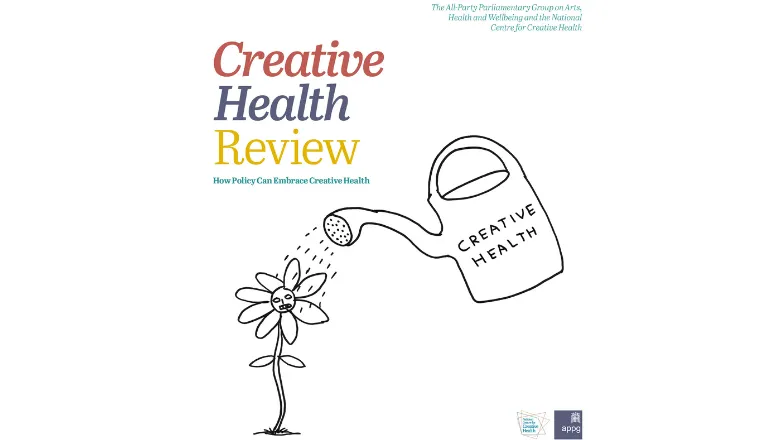
Yesterday saw King’s host the launch of the Creative Health Review report, a collaboration between the National Centre for Creative Health (NCCH) and the All-Party Parliamentary Group on Arts, Health and Wellbeing.
Partners, health and social care and government representatives, artists and people with lived experience gathered together at Science Gallery London on Guy’s Campus and online to celebrate the launch of the report, which offers a set of recommendations on how policy can embrace Creative Health.
The landmark report evidences how Creative Health can form an integral part of a health and social care system aimed at reducing health inequalities and building social capital. It demonstrates that creativity is not just a nice to have, but fundamental to individuals, communities, and systems.
The report findings show that Creative Health supports people to live well for longer, reduces the pressure on health and social care systems and contributes to a healthy and prosperous society. The report makes recommendations to UK Government and Metro Mayors for a cross-departmental strategy on Creative Health, which will support Creative Health to flourish and maximise its potential across key policy areas.
Click here to read the Creative Health Review report.
Roundtable explores the role of art in young people’s mental health
The launch at Science Gallery London was preceded by a King’s-hosted roundtable focused on one of the major themes of the Creative Health Review: mental health and wellbeing.
Chaired by Professor Sir Simon Wessely, the roundtable saw representatives from across and beyond King’s including Professor Ulrike Schmidt, Professor Craig Morgan, representatives from the Greater London Authority, Southwark Council, King’s Medical School, Science Gallery London alongside young participants of recent programmes in mental health and wellbeing.
The discussion explored how to better promote the exchange of knowledge and research findings among researchers and stakeholders in the field and encourage dialogue. It was also highlighted that there are now Creative Health posts in place at each of the 7 NHS regions across the UK, making a huge difference in creating connections between arts and health.
The group emphasised the importance of focusing on innovative methodologies and interdisciplinary approaches, as well as ensuring that creative arts programmes for mental health are inclusive and culturally diverse, addressing the needs of a wide range of young people.
The roundtable also covered the fact that there is more work to do on bringing together clinical humanities and creative health in developing the next generation of health professionals.
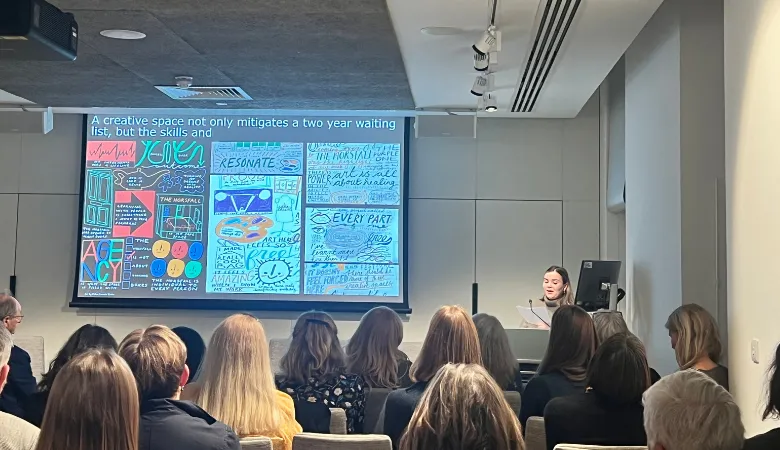
Creative Health Report launch
The roundtable was followed by the official launch of the Creative Health Review report. Featuring speakers including Chair of the Commission, Lord Howarth of Newport, and report commissioners including Monty Don, Baroness Lola Young, Professor Sir Michael Marmot and James Sanderson, the launch explored various areas of the reports recommendations, and featured those with lived experience and musicians from the local area who perform in hospitals.
Alex Coulter, Director of the National Centre for Creative Health, opened and chaired the event.
The evening began with Josie Moon and Kelly McLaughlin from the community group East Marsh United, Grimsby, who made a case for the role of the arts in transforming local communities for the better. Kelly read a poem, which included the line; 'creativity has been my medicine, my safety and my recovery'.
This was followed by words from Gemma O'Brien, an artist and change-maker, and member of the charity 42nd Street in Manchester, who sat on the lived experience panel on young people's mental health and creativity for the report. Reflecting on her own experience of arts-based interventions to improve mental health, Gemma said, ‘Art became not just an action, but a way of processing experiences’. ‘Creativity for many young people is a lifeline', she added later.
Professor Sir Michael Marmot spoke next, emphasising the importance of valuing quality of life and meaning against a landscape in which society’s general health has stopped improving, with inequalities getting bigger. He highlighted the role of Government in providing the facilities in which people can be creative. Monty Don argued for the right of all people to access green space and the outdoor domestic life, as the benefits to mental health have been strongly evidenced.
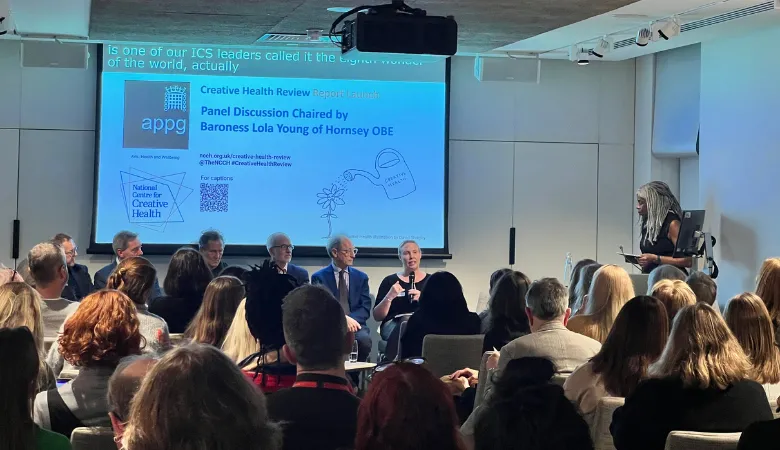
A panel discussion led by Baroness Lola Young of Hornsey OBE featured representatives from across NHS England, as well as GPs, academics and experts. The discussion highlighted the 2 million people who have already been supported through social prescribing, and the data-driven evidence which is solidifying its role in modern treatment. Baroness Hornsey led the panel to explore why there is such resistance to embedding creative interventions, despite all the evidence that it works. They acknowledged that securing funding is an important priority, as well as creating the conditions where embedding Creative Health is possible and training health professionals in the field.
Poet Arji Manuelpillai offered a poem ‘Breathe’ inspired in part by his work with Breathe Arts. Closing the event, Professor Richard Trembath, Senior Vice President (Health & Life Sciences) and Executive Director of King’s Health Partners, shared emerging findings from King’s SHAPER programme, in anticipation of outcomes which will be published in 2024. This includes clinical trials showing clear evidence that creative interventions can improve the quality of life and health of people with Parkinson’s, postnatal depression, brain injury and stroke.
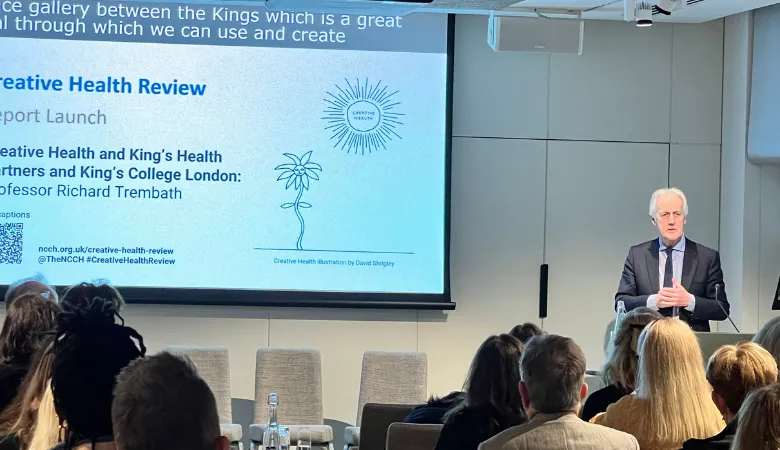
Creative Health research at King’s
King’s is proud to have played a key role in the original Creative Health inquiry, the findings of which were published in 2017, and continue to make a distinctive contribution to the Creative Health field across evidence, policy and practice.
Findings from the original inquiry included the need to:
- further build the evidence base for Creative Health especially for longitudinal programmes
- investigate how to scale-up effective programmes
- explore how to embed these programmes in clinical pathways, including as part of social prescribing
King’s, in partnership with University College London, responded to these challenges, and bid successfully to Wellcome Trust for a 4.5 year, £2.5 million grant for the SHAPER programme – Scaling Health Arts Programmes Effectiveness Research.
The programme has been led by Professor Carmine Pariante, with co-investigators Dr Daisy Fancourt (UCL), Professor Paola Dazzan and Professor K. Ray Chaudhuri. It is devised and managed by Dr Tony Woods & Nikki Crane.
“As the lead investigator of the programme”, says Professor Pariante, “I truly enjoyed co-developing the work with the artists and the challenge of thinking at news ways to conduct research that are methodologically rigorous while allowing for the flexibility that arts and health require.”
SHAPER has been building the evidence base for Creative Health, including investigating how to scale-up effective programmes and explore how to embed arts programmes in clinical pathways, including as part of social prescribing. Emerging outcomes and findings will be published in 2024.



